The affiliate marketing sector is a multibillion-dollar industry with exciting opportunities for creators. It’s become a common way for ecommerce brands to promote their products and services, with a reported 79% of online companies leveraging affiliates.
The best affiliate marketing programs are often free to join, so it doesn’t cost much to start affiliate marketing. Many entrepreneurs begin affiliate marketing as a side hustle and grow their businesses over time.
This beginner’s guide to affiliate marketing will help you get up and running fast. Learn how to find an affiliate program, create affiliate links, and start earning as an affiliate partner.
How affiliate marketing works
Affiliate marketing is a sales model where a company pays a third party to sell a product or service.
If you’ve ever listened to a podcast ad or seen a social media influencer promote a product, you’ve likely observed affiliate marketing.
In exchange for recommending products and services to their audiences, affiliate partners receive a commission for any sales made as a result of their referrals.
When you become an affiliate, you’ll receive a unique link that allows your program manager to track every customer you send their way. When a customer purchases the product through your link, you earn a commission.
🌟 Do you want to become an affiliate marketer but have limited funds? Learn how to start an affiliate marketing business with no money.
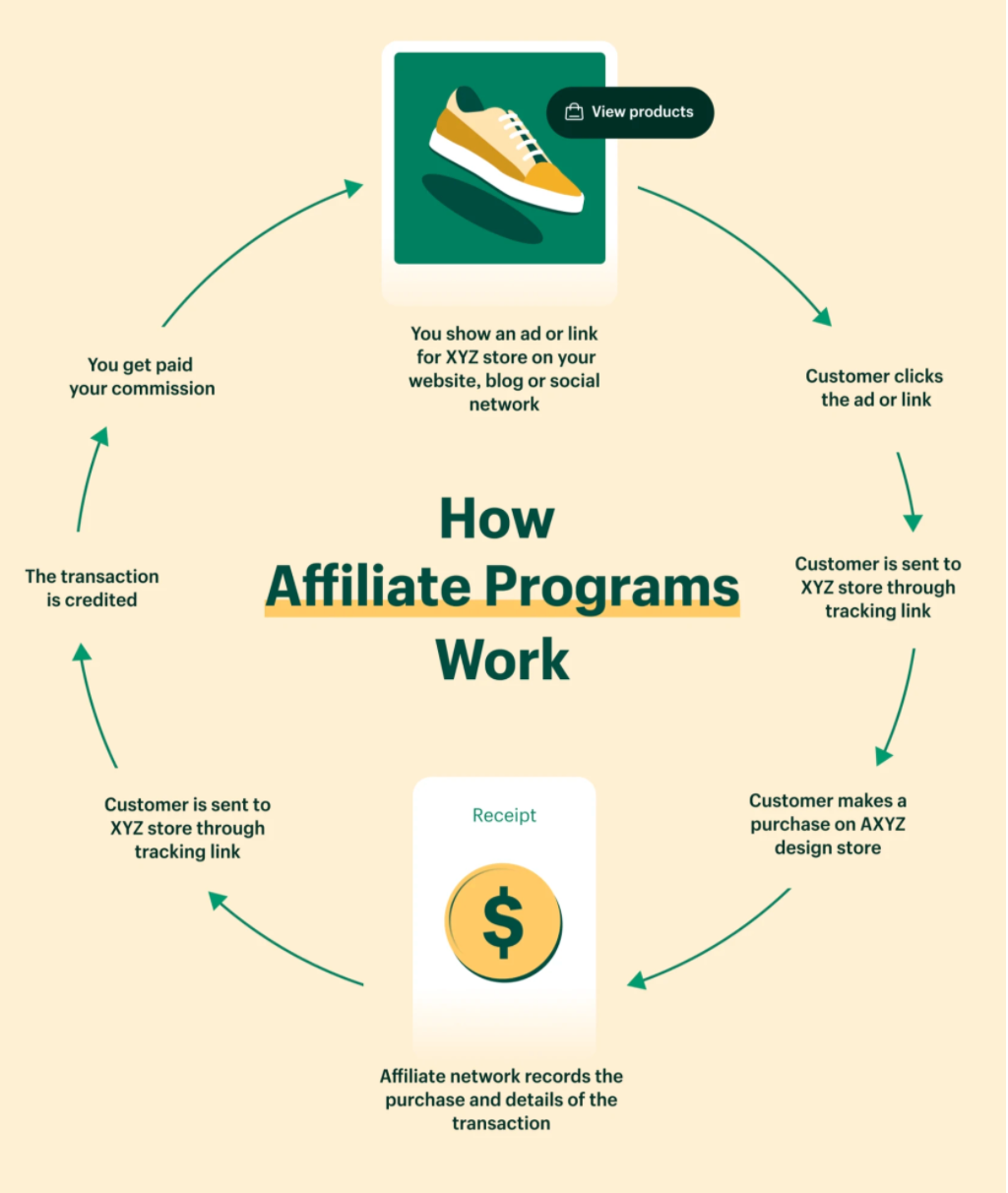
You can find an affiliate program directly through a company or via an affiliate network that lists multiple programs. Regardless, here’s how the standard affiliate program works:
1. You promote Store XYZ on your website, blog, or social network.
2. Someone clicks your unique link.
3. They make a purchase in Store XYZ.
4. The company or affiliate network records the transaction.
5. The purchase is confirmed by Store XYZ.
6. You receive a commission.
For example, Instagrammer @caullenfit promotes the watch brand MVMT, directing users toward the affiliate link in his bio. MVMT has an affiliate program to attract lifestyle influencers like him.
If you click on the link in his bio, you’ll see further links to all the brands that Caullen promotes, including MVMT.
Clicking one of those links stores a cookie on your device. This tracks your visits to the affiliate, so the program manager can compensate Caullen for a successful referral, even if you visit MVMT at a later date.
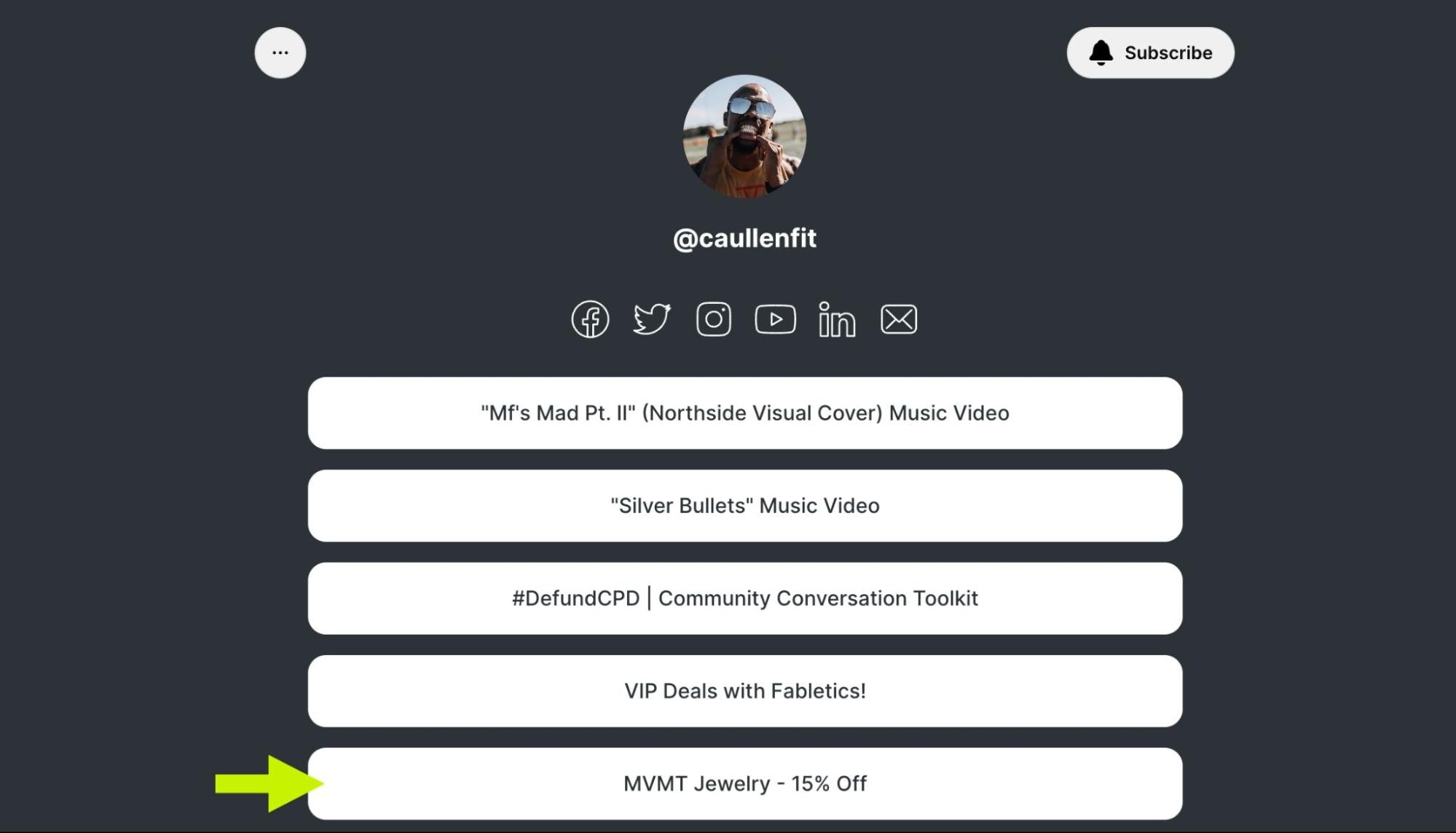
If you then decide that you want to buy a MVMT watch, when you check out, 8% of that purchase will go into @caullenfit’s pocket. Caullen also offers his audience a 15% discount via the affiliate link on his link-in-bio page.
How to start affiliate marketing
- Decide on a niche
- Choose your affiliate marketing channel
- Find a relevant affiliate marketing program
- Create valuable content
- Build an audience
- Follow FTC regulations
1. Decide on a niche
A niche is a segment of a larger market defined by unique characteristics. It becomes your specialty and the topic people will know you for. Travel blogging would be an affiliate marketing niche, as would pet care or tiny homes.
These aren’t your only options, of course. There are hundreds of affiliate marketing niches available. So how do you go about finding a profitable niche that interests you? Consider the following:
- Do you want to learn more about the niche? You’ll need to become a subject matter expert on your topic by constantly learning and staying on top of trends.
- Can you solve problems within the niche? Affiliate marketers often have special training or experience in a specific niche. This gives them new ways to present information and help people solve problems.
- Is the niche profitable? Lucrative niches are rarely untapped. A niche that contains a few competitors is a sign that there are customers ready to buy.
The goal is to choose a niche with good business prospects, but also one that you enjoy. Running an affiliate business takes commitment and time. If you enjoy the process, you’ll be more likely to stay committed.
2. Choose your affiliate marketing channel
The next step is considering what channels you’ll use to reach your audience. Each affiliate marketer has a different approach.
For example, while affiliate marketer Ryan Robinson has an Instagram account, his blog is his core source of income. Other marketers focus solely on Instagram or TikTok affiliate marketing to earn commissions.
Many newcomers to affiliate marketing will set up one of these two channels:
A niche product review website
These sites review companies’ products for a specific audience and compare products with each other. They can also publish buyer’s guides and product tutorials to help shoppers make buying decisions, such as the The New York Times’ Wirecutter affiliate marketing site.
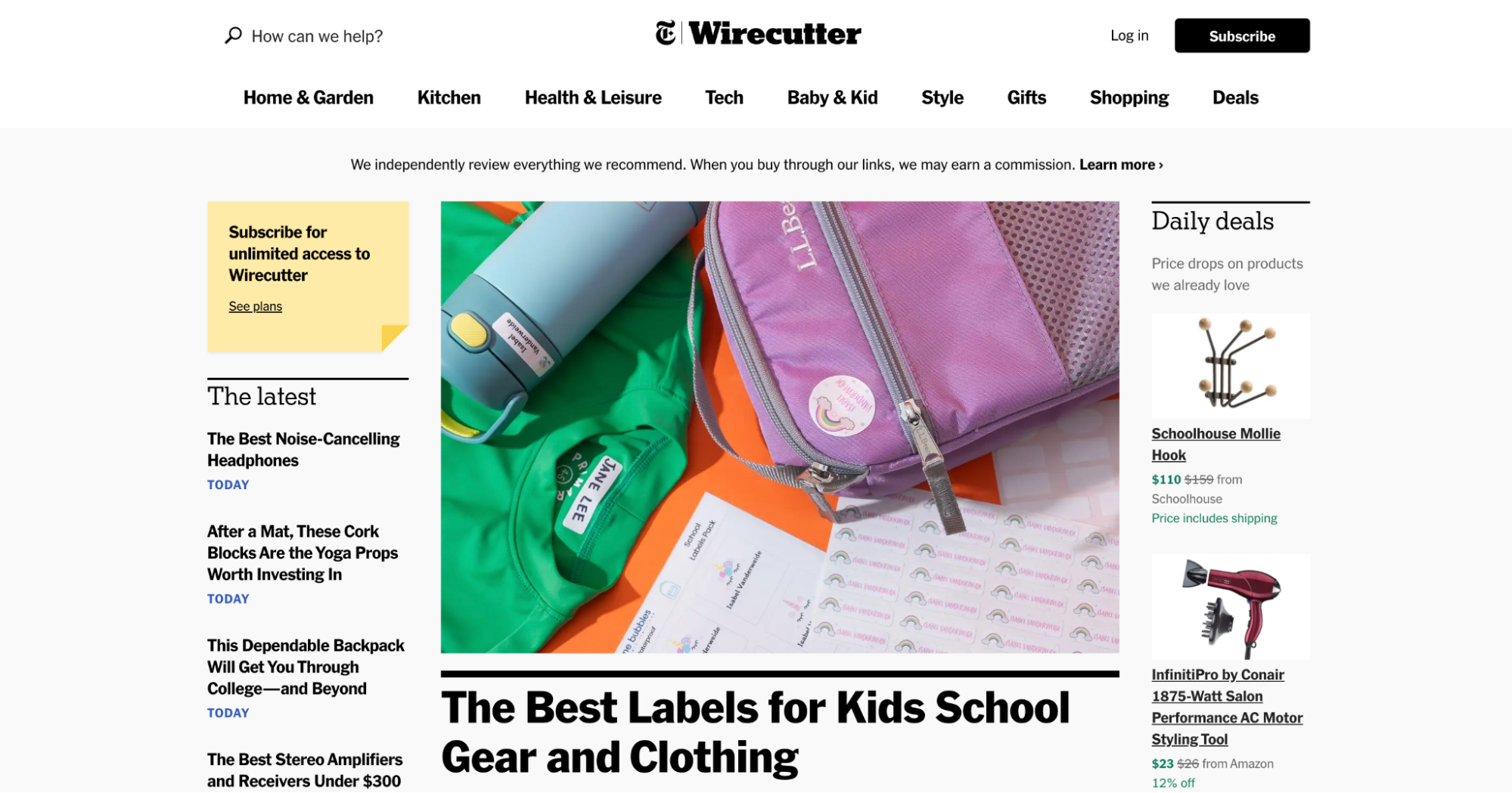
Informational content for blogs and social media
Bloggers, social media influencers, and YouTubers publish affiliate content that resonates with their audience to gain influence and encourage clicks.
A good example is how Ryan Robinson’s blog focuses on freelancers. He regularly publishes new content related to freelancing to draw in an audience that’s relevant to the brands that he’s affiliated with.
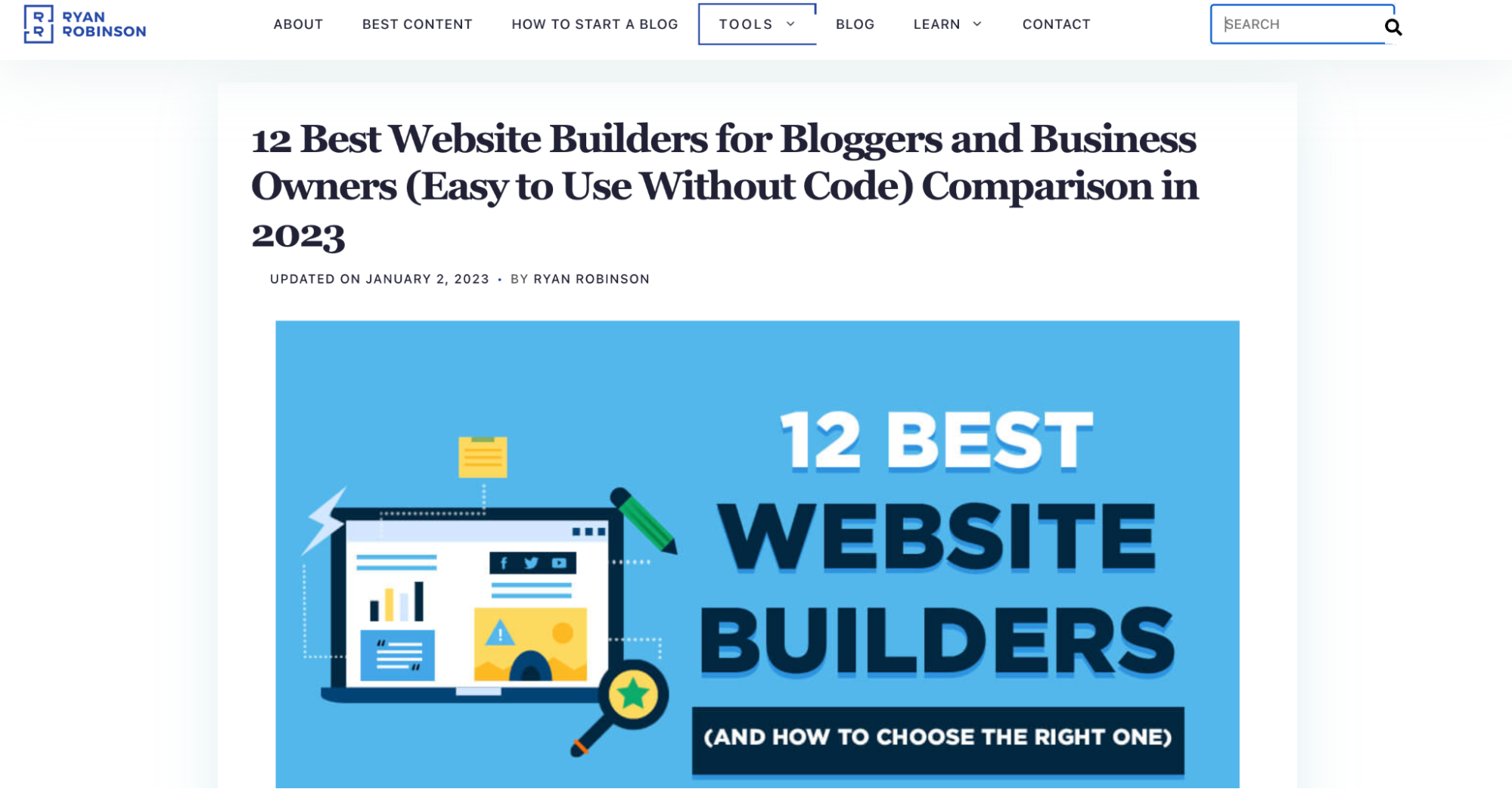
Authenticity and audience engagement are two critical elements of affiliate marketing. If you can’t connect with your audience, they likely won’t buy the products you recommend.
Not sure which platform to choose? Start where you’re comfortable. If you enjoy creating social media videos, make Instagram your platform. If you’re a good writer, maybe blogging is the best route for you. Creating on platforms you already understand will help you create content that connects with your audience and drives affiliate sales.
Are you great at making YouTube videos? YouTube offers its own affiliate marketing program. To be eligible to join, you must meet specific criteria, including participating in the YouTube Partner Program, being US-based, and having more than 20,000 channel subscribers.
Brands can also join the YouTube Shopping affiliate marketing program. Eligible Shopify merchants can seamlessly sync products to YouTube through the Google & YouTube app on Shopify. This enables creators to tag products to their videos and allows viewers to shop while they watch.
3. Find a relevant affiliate marketing program
Ensure the right fit by focusing on affiliate offers and products that will appeal to your audience, and not just on high-paying affiliate programs.
A few things to look for when choosing an affiliate program include:
- Does the affiliate have a good brand reputation? Only work with partners that customers trust. Fortunately, affiliate networks vet programs and present reliable, profitable merchants you can work with.
- Does the affiliate program have a good commission rate? You want to earn good money for your time and effort. Many programs pay upward of 20% commissions for a sale. Choose a rate that works for you.
- Does it have a high earnings per click (EPC) rate? EPC is an industry-wide metric that shows the average affiliate earnings per 100 clicks across a merchant’s affiliate program. Many affiliate networks show you this information for each program.
Finding an aligned program is critical to running a successful affiliate business. For example, True Crime Obsessed is a comedic podcast where best friends and hosts Patrick Hinds and Gillian Pensavalle talk with a comedic spin about truecrime documentaries.
Using this very particular take on a popular niche, they garnered over 200 million downloads and leveraged their audience to promote a variety of affiliate products and services. When a listener clicks an affiliate link and buys a product, they receive a commission.

To find good affiliate opportunities, ask your favorite brands if they have an ambassador or affiliate program. That way you can promote products you already appreciate and enjoy.
You can also find products and brands to work with in the following affiliate marketplaces:
4. Create valuable content
In 2023, people spent an average of six hours and 35 minutes online per day. There’s no doubt that global attention is available for online content creators, but to capture it, you must make your content valuable to a specific audience.
Blogs are a good way to create relevant content, with a reported 65% of all affiliate marketers generating traffic through blogging alone.
Promoting an affiliate link on social media is another free way to get your content into the hands of the people who might be interested in it. There are plenty of affiliate marketers who operate entirely on social media, like @taylerfit who built her TikTok account to over 460,000 followers with fitness content. She makes money promoting brands like 1UpNutrition through affiliate marketing.
On Tayler’s link-in-bio page, fans can find affiliate links to the products she promotes in her content. She makes affiliate income every time a fan clicks and buys one of those affiliate products.
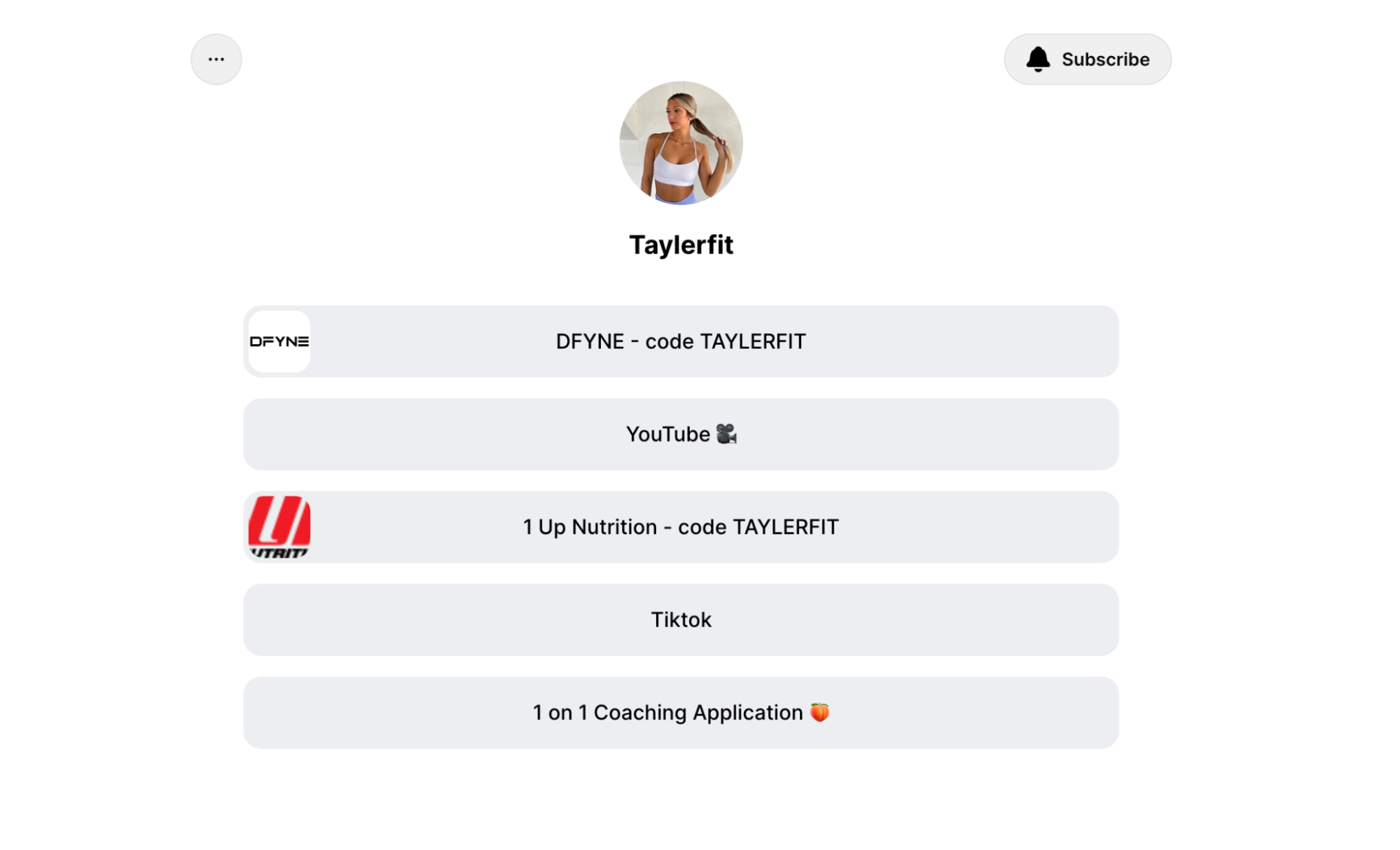
5. Build an audience
To build an audience, first you have to reach them. Creating email lists helps you to directly reach your audience. You can send newsletters, updates on new content, and exciting offers directly to anyone who signs up to be a part of your email list.
If you’re operating mostly on social media, follow and tag influencers who may be interested in your niche. The name of the game is to do what you can to increase the traffic to your website or social media page.
Reeling them in is just the first part, now it’s important to build trust between you and your audience to keep them coming back.
Don’t just try and sell anything to your audience in order to gain a quick buck. The more they feel your genuine interest, the more they will trust you.
6. Follow FTC regulations
The FTC protects consumers from deceptive marketing practices. Unfortunately, there are affiliate marketers out there who are more than willing to promote scams and misleading products.
To prevent this, the FTC requires that any affiliate marketer disclose their financial relationship with any brands or products that they are promoting. In short, you need to tell your audience that you’re getting compensated for promoting the products you’re promoting, and you must always tell them when a link is an affiliate link in order to stay compliant with the FTC.
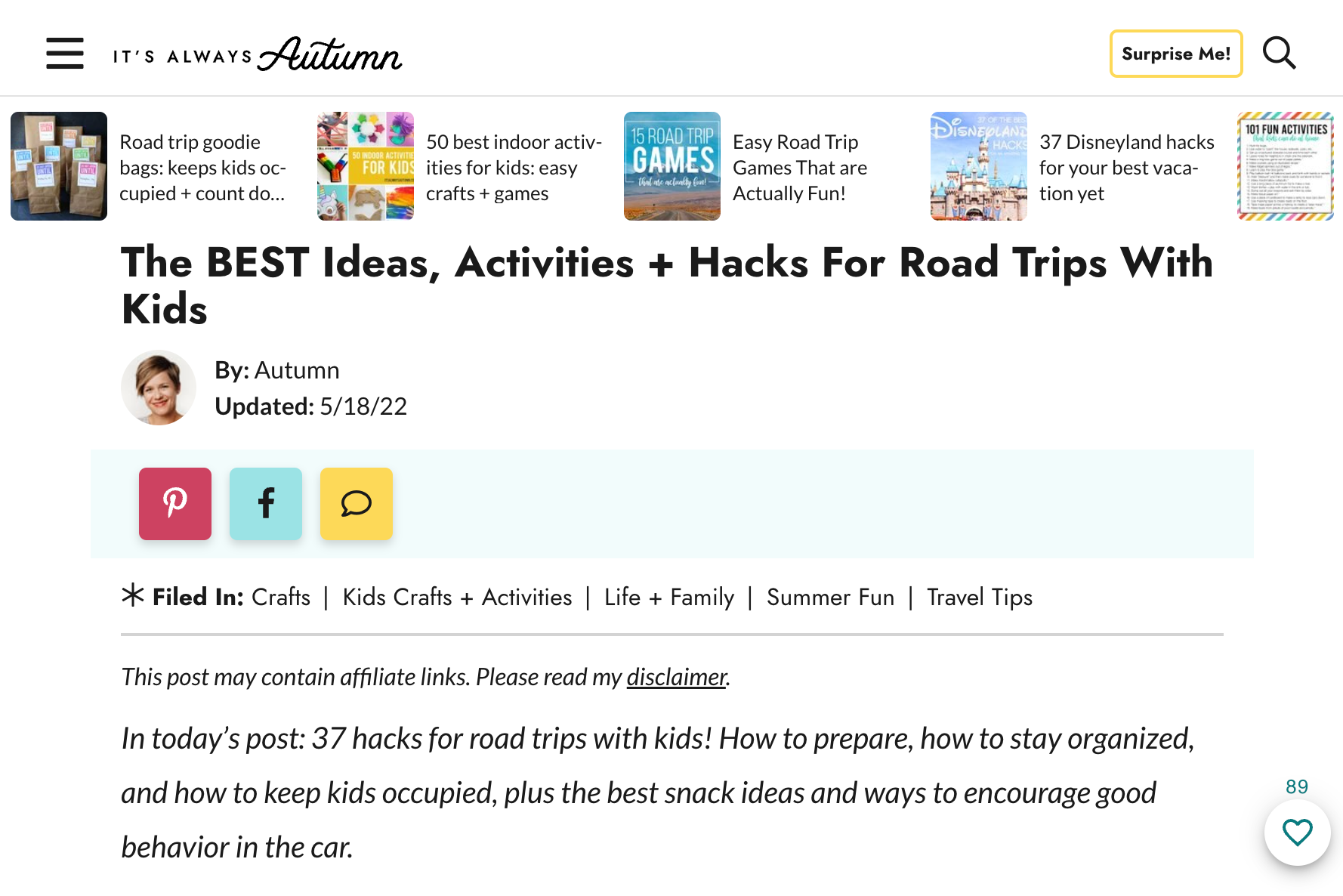
If you’re not in the US, you may be subject to different laws and regulations concerning promoted content. Ensure that you’ve checked with the relevant government body in your region.
What are the benefits of affiliate marketing?
Now that you understand how affiliate marketing works, here are some of its key benefits.
You don’t own the products you’re promoting
Most public affiliate programs are larger and don’t require that you buy any of the products you recommend, like Amazon Associates. You simply join their affiliate program, grab your link, and post it on your page or website.
It’s perfect when you’re starting out, because you don’t have to invest a bunch of money off the bat. You can take time and experiment to see which types of products and services are gaining the most traction with your audience.
It’s a passive income source
Once you’ve established the groundwork to keep traffic coming to your site, you’re pretty much set. All you have to do is choose the right affiliate partners that will appeal to your audience and post those links. Your unique links and codes will continue to bring in a recurring commission for you, as long as you keep them visible on your site.
It has high earning potential
Affiliate marketing has six-figure earning potential for newcomers. You may not bring in that sort of money right at the jump, but there is real potential for affiliate marketing to replace your nine-to-five.
Back in 2016, affiliate marketer Pat Flynn told Business Insider that he earns up to $170,000 per month from affiliate commissions.
Adventure junkie and founder of affiliate website Biking Know How Rohan Kadam also turned his blog from a passion project into a successful online business by using affiliate sales. “I scaled my business, especially during the COVID pandemic, and made it profitable in a short period,” he says.
How much can you make as a new affiliate marketer?
How much you can make with affiliate marketing is completely up to you. It’ll depend on how much traffic you can generate, how well you gauge which affiliate products and services your audience will respond to, and the commission rates of the affiliate programs you join.
Commission rates vary widely among affiliate programs. High-ticket programs may offer higher rates and larger payouts, but this needs to be balanced against less frequent sales. Programs for lower-value products typically offer 1% to 20% commissions on sales, which may be more frequent.
Some brands operate their own affiliate programs with bespoke commission models such as flat rate commissions or payment for traffic rather than sales. As your performance improves, you may also be able to negotiate preferable rates with your affiliate partners.
Become a Shopify Affiliate
Join the program to grow your brand, access exclusive opportunities, and earn a competitive commission for each new business you refer to Shopify.
Earn passive income with successful affiliate marketing
There’s no doubt affiliate income is a smart way to earn money online. With a little time and effort upfront, you can build an audience and earn consistent payouts through your affiliate site—all without taking on too much risk.
Affiliate marketing for beginners FAQ
How do I start affiliate marketing as a beginner?
- Decide on a niche
- Choose your platform
- Find relevant affiliate marketing programs on affiliate networks
- Create valuable content
- Build an audience
- Follow FTC disclosure regulations
How much do beginner affiliate marketers make?
Beginner affiliate marketers typically make up to 30% commission per sale. Depending on the number of sales made, beginner affiliate marketers can make anywhere from $10,000 to $100,000 annually.
What are the best affiliate marketing opportunities for beginners?
The best affiliate marketing opportunities for beginners are programs that are related to that creator or marketer’s niche. Look for programs that pay higher commission rates and those related to trends and popular search terms. Search for these opportunities on affiliate networks or marketplaces like:
- CJ
- ClickBank
- FlexOffers
- ShareASale
- Awin
Is affiliate marketing worth it for beginners?
Affiliate marketing work is worth it for beginners because you can start with no money. You can gain and grow your target audience on free platforms such as TikTok and Instagram, and promote your affiliate products without any upfront costs.
What are the three main types of affiliates?
The three main types of affiliates are unattached affiliate marketing, related affiliate marketing, and involved affiliate marketing.



